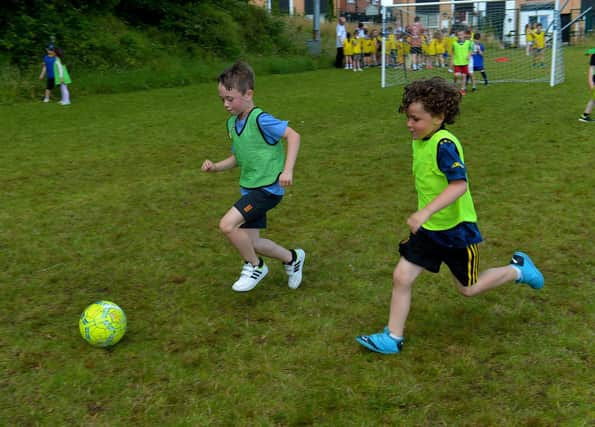SEAN CONNOR: How should we measure success in our youth sport


His team lost by three points after extra time, and at the final whistle, all bar a few of his teammates dropped to the ground in the agony of defeat. My son, thankfully, removed his gloves, shook hands with his direct opponent and then the other players he had just battled against before attempting to console his own teammates.
He had played well, scoring a last-minute goal to take the game into extra time but it was not his performance on the night that made me happy, it was his reaction to the defeat. He realised getting to the final was an achievement and had left nothing on the field. He understood this was all part of his development as a player and a person. This defeat was not going to define him, but he would learn and reflect, using this experience for the future.
Advertisement
Hide AdAdvertisement
Hide AdWe have talked about this since he began playing sports. I have always attempted to focus on the process of him developing as a player and a person. Technical development and tactical acumen ahead of physical development (which I believe comes naturally and with time) and most importantly, emotional development and the ability to assess and understand what has just taken place. His reaction got me thinking about the professionalism of youth sport and how it’s occurring at younger age groupings. It is also very obvious in the modern era that so many young players in every sport judge their season by simply winning or losing. So, how should we measure success in youth sport? Can we measure success while neglecting the scoreboard?


Now, I am not saying the score does not matter but, as legendary San Francisco 49ers coach, Bill Walsh’s book on his philosophy of leadership, states: ‘The score takes care of itself’. He who understood that if you did not focus on your people and treat them right, you will never get the best out of them and winning would not happen. So, the question I’m trying to answer is this: Is judging your success as a coach or a team through the spotlight of competition the only way it can be viewed?
I say no. For me, as a coach, there are a myriad of ways we can judge success within a youth coaching environment. Your development of individual players and your team can be judged in their overall athletic development and improvement in your players, via personal bests, new skill acquisition. On a more personal level, you can look to see if you have improved players’ confidence, self-awareness or their ability to work within a team environment. All young athletes feel happier when they feel involved and feel they belong.
Can your players say that they do? They all want to feel that they are improving at their own pace and that they are valued. Retaining your players season after season is another true measure of success. It is vital, as coaches, we consider what we measure and value. These factors influence what we teach our players is important. This then feeds into their behaviour and reactions during and after events. Basically, the measures we make visible to our players and parents influence the environment and this drives the behaviours of a group. So, if you’re going to look beyond the scoreboard and really value these other indicators, it’s very important these measures have visibility, just as much as a league table or number of goals scored or conceded.
Advertisement
Hide AdAdvertisement
Hide AdSo, how can you measure these other indicators of success? You can start by communicating with players and parents alike. Do your players feel they have improved and added to the skill repertoire? In other words, has their competence increased? Has their confidence increased in their own ability and that of their teammates? Do all your players feel they have the ability to make decisions? Having said all this, we cannot ignore the most visible measure in sport; the scoreboard, the league table, the awards and the cups. All these are vital as well. After all, sport is about competition and playing to win. These measures alone, however, are not the only ways to judge success or development. So, maybe the next time your asked by someone, ‘How did your season go?’ you will look at the less obvious measures. Why not take a look at the behaviours you have installed in your players, the small incremental improvements in skill and game understanding. The closeness between you and the group, the friendships that have developed between.
By taking responsibility for your ‘trademark behaviours’ that you reward and encourage, you may well have just had a more successful season than the league table or scoreboard indicated. The answer you give to the question then should be a very different one than the obvious. In fact it will be clear to all those on the outside looking in that your success as a youth coach lies beyond a league table, or a trophy cabinet. If you are consistent in your application of these measures you will be very pleasantly surprised. You will begin to understand that, as Bill Walsh said, ‘The score takes care of itself’.
As Franklyn D Roosevelt said: ‘We cannot always build the future for our youth but we can build our youth for the future’. So build. Develop players of character, develop competence, create an environment in which players are able to think and act for themselves and the betterment of the team. Most important of all, make each player feel connected to the group and valued. Do all this and you will see true success beyond the scoreboard, and long after the season has finished.